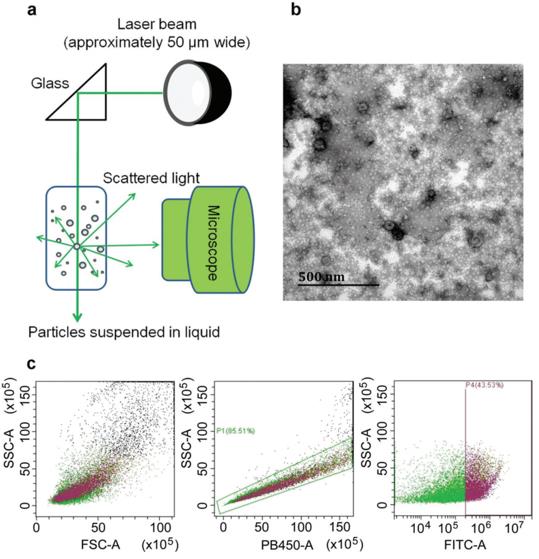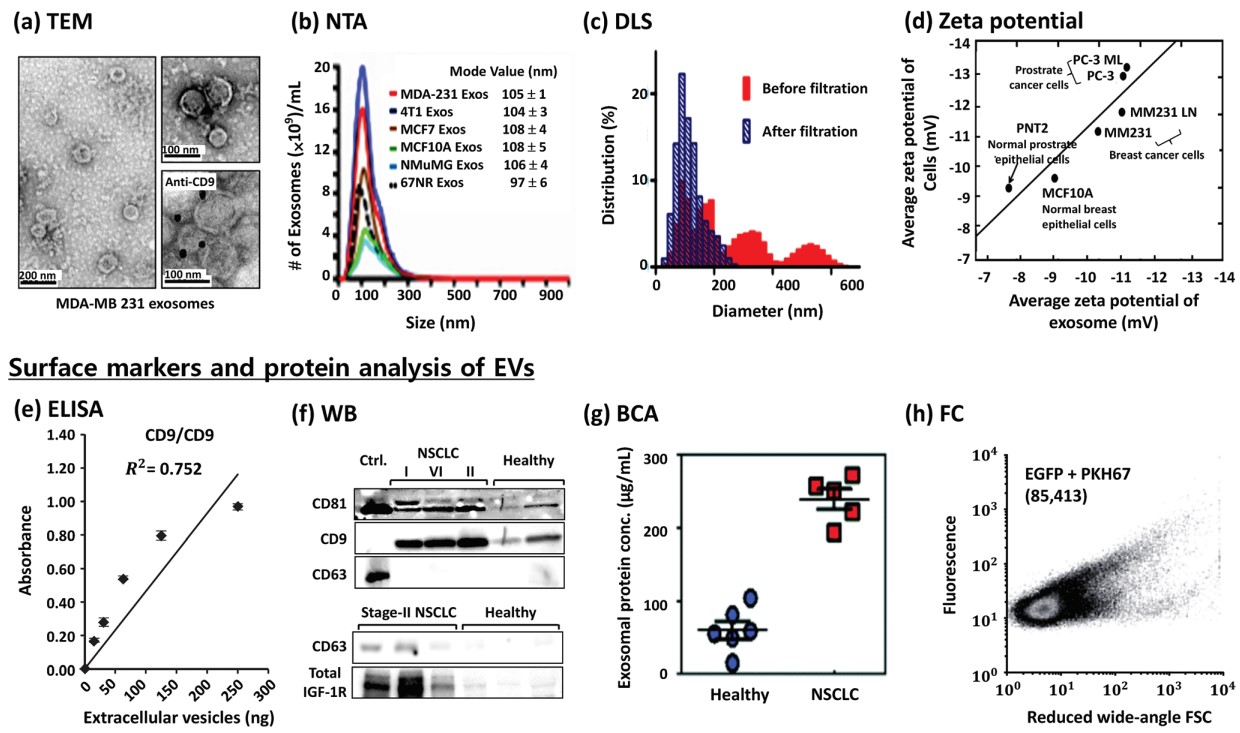- You are here: Home
- Services
- Exosome Research Services
- Exosome Identification
Services
-
Cell Services
- Cell Line Authentication
- Cell Surface Marker Validation Service
-
Cell Line Testing and Assays
- Toxicology Assay
- Drug-Resistant Cell Models
- Cell Viability Assays
- Cell Proliferation Assays
- Cell Migration Assays
- Soft Agar Colony Formation Assay Service
- SRB Assay
- Cell Apoptosis Assays
- Cell Cycle Assays
- Cell Angiogenesis Assays
- DNA/RNA Extraction
- Custom Cell & Tissue Lysate Service
- Cellular Phosphorylation Assays
- Stability Testing
- Sterility Testing
- Endotoxin Detection and Removal
- Phagocytosis Assays
- Cell-Based Screening and Profiling Services
- 3D-Based Services
- Custom Cell Services
- Cell-based LNP Evaluation
-
Stem Cell Research
- iPSC Generation
- iPSC Characterization
-
iPSC Differentiation
- Neural Stem Cells Differentiation Service from iPSC
- Astrocyte Differentiation Service from iPSC
- Retinal Pigment Epithelium (RPE) Differentiation Service from iPSC
- Cardiomyocyte Differentiation Service from iPSC
- T Cell, NK Cell Differentiation Service from iPSC
- Hepatocyte Differentiation Service from iPSC
- Beta Cell Differentiation Service from iPSC
- Brain Organoid Differentiation Service from iPSC
- Cardiac Organoid Differentiation Service from iPSC
- Kidney Organoid Differentiation Service from iPSC
- GABAnergic Neuron Differentiation Service from iPSC
- Undifferentiated iPSC Detection
- iPSC Gene Editing
- iPSC Expanding Service
- MSC Services
- Stem Cell Assay Development and Screening
- Cell Immortalization
-
ISH/FISH Services
- In Situ Hybridization (ISH) & RNAscope Service
- Fluorescent In Situ Hybridization
- FISH Probe Design, Synthesis and Testing Service
-
FISH Applications
- Multicolor FISH (M-FISH) Analysis
- Chromosome Analysis of ES and iPS Cells
- RNA FISH in Plant Service
- Mouse Model and PDX Analysis (FISH)
- Cell Transplantation Analysis (FISH)
- In Situ Detection of CAR-T Cells & Oncolytic Viruses
- CAR-T/CAR-NK Target Assessment Service (ISH)
- ImmunoFISH Analysis (FISH+IHC)
- Splice Variant Analysis (FISH)
- Telomere Length Analysis (Q-FISH)
- Telomere Length Analysis (qPCR assay)
- FISH Analysis of Microorganisms
- Neoplasms FISH Analysis
- CARD-FISH for Environmental Microorganisms (FISH)
- FISH Quality Control Services
- QuantiGene Plex Assay
- Circulating Tumor Cell (CTC) FISH
- mtRNA Analysis (FISH)
- In Situ Detection of Chemokines/Cytokines
- In Situ Detection of Virus
- Transgene Mapping (FISH)
- Transgene Mapping (Locus Amplification & Sequencing)
- Stable Cell Line Genetic Stability Testing
- Genetic Stability Testing (Locus Amplification & Sequencing + ddPCR)
- Clonality Analysis Service (FISH)
- Karyotyping (G-banded) Service
- Animal Chromosome Analysis (G-banded) Service
- I-FISH Service
- AAV Biodistribution Analysis (RNA ISH)
- Molecular Karyotyping (aCGH)
- Droplet Digital PCR (ddPCR) Service
- Digital ISH Image Quantification and Statistical Analysis
- SCE (Sister Chromatid Exchange) Analysis
- Biosample Services
- Histology Services
- Exosome Research Services
- In Vitro DMPK Services
-
In Vivo DMPK Services
- Pharmacokinetic and Toxicokinetic
- PK/PD Biomarker Analysis
- Bioavailability and Bioequivalence
- Bioanalytical Package
- Metabolite Profiling and Identification
- In Vivo Toxicity Study
- Mass Balance, Excretion and Expired Air Collection
- Administration Routes and Biofluid Sampling
- Quantitative Tissue Distribution
- Target Tissue Exposure
- In Vivo Blood-Brain-Barrier Assay
- Drug Toxicity Services
Exosome Identification
Secreted exosomes play important roles in the pathogenesis of various diseases. The quality and purity of isolated exosomes is crucial for their functions and may directly affect the outcome. Creative Bioarray's exosome identification service makes it easy to detect and characterize exosomes with our well-experience working on exosomes. Our expertise characterizes isolated exosomes in many different ways including particle size, quantity, specific antibodies, and more. We are dedicated to providing our customers with well-developed assays and high quality data at a competitive price.
 Figure 1 Schematic representation of three newly developed exosome‐characterization methods: nanoparticle‐tracking analysis, transmission electron microscopy, and flow cytometry.
Figure 1 Schematic representation of three newly developed exosome‐characterization methods: nanoparticle‐tracking analysis, transmission electron microscopy, and flow cytometry.
Exosomes can be characterized by transmission electron microscopy (TEM), nanoparticle tracking analysis (NTA), and flow cytometry (FC). Creative Bioarray provides comprehensive support for your exosome identification by including the morphology assay, purity and quantity assay, particle size distribution analysis, and exosome-specific markers expression. We also provide customized services to meet your demands.
 Figure 2 Characterization of extracellular vesicles (EVs).
Figure 2 Characterization of extracellular vesicles (EVs).
Creative Bioarray provides the following services for all of your exosome identification needs. Send us your biofluids or prepared exosomes, choose identification services, we are capable of tailoring the assays to meet your needs.
- Electron microscopy assay
The size and morphology of the exosomes were determined by electron microscopy.
- Nanosight analysis
Particle size and exosome concentration can be detected by our Exosome Nanosight Analysis Service. With this characterization method, you can get a clearer picture of the quality of your exosomes and a report with the particle analysis data.
- Flow cytometry assay
Flow cytometry is a valuable technique to study exosomes specific surface markers. Furthermore, the protein content of the exosomes can be measured by flow cytometry.
- Exosome-specific markers detection
Exosomal markers exhibit higher specificity and stability than other biomarkers found in biological fluids. Our service provides common exosome specific markers according to the cell type.
- Customized services: Exosomal lipids, proteins and RNAs characterization depending on from what cell type the exosomes are released.
With our extensive experience working on exosomes and state-of-the-art instrumentation, you can rely on Creative Bioarray's expertise for exosome research services. We can also customize the assay according to the purpose of the clients. If you have any special needs or questions regarding our services, please feel free to contact us. We look forward to working with you in the future.
References
- Zhang, M.; et al. Methods and technologies for exosome isolation and characterization. Small Methods. 2018, 2(9): 1800021(1-10).
- Sunkara, V.; et al. Emerging techniques in the isolation and characterization of extracellular vesicles and their roles in cancer diagnostics and prognostics. The Analyst, 2016, 141(2): 371-381.
Explore Other Options
For research use only. Not for any other purpose.

